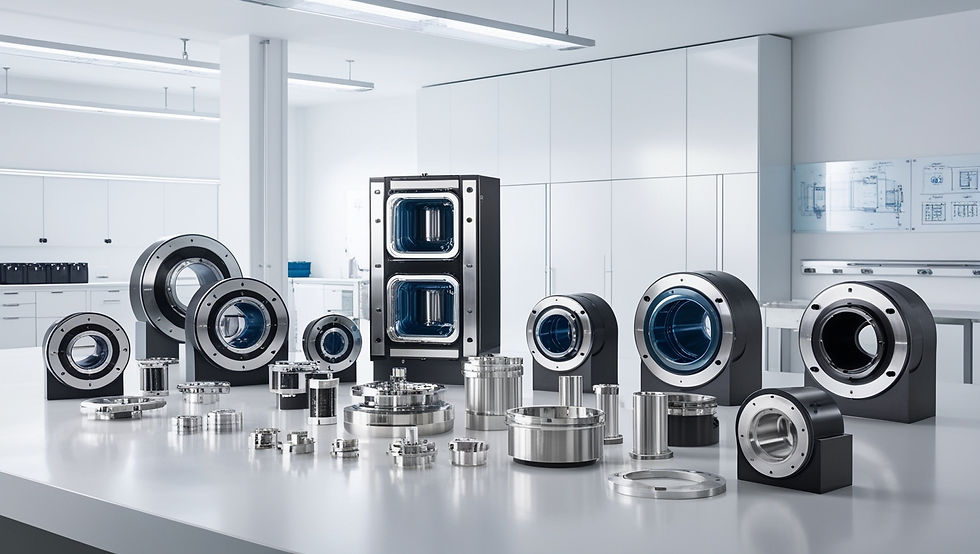Aluminum CNC Machining Parts: Applications and Benefits
- synergypepg
- Feb 19
- 3 min read
Aluminum CNC machining parts have become essential in various industries due to their lightweight, high durability, and excellent machinability. Whether in automotive, aerospace, or electronics, aluminum components ensure efficiency and precision. This article delves into the applications and benefits of aluminum CNC machining parts, highlighting why they are a top choice for manufacturers worldwide.
What Are Aluminum CNC Machining Parts?
Aluminum CNC machining parts are precision-engineered components created through Computer Numerical Control (CNC) machining. This process involves using automated tools to cut, drill, and shape aluminum materials highly, resulting in complex and customized parts with minimal errors.
Key Applications of Aluminum CNC Machining Parts
1. Automotive Industry
Aluminum CNC machined parts are widely used in engine components, brackets, and transmission systems. Their lightweight nature helps reduce vehicle weight, improving fuel efficiency without compromising strength.
2. Aerospace Industry
Precision and durability are critical in aerospace applications. Due to their high strength-to-weight ratio and corrosion resistance, CNC-machined aluminum parts are used in aircraft structures, engine components, and landing gear.
3. Electronics and Consumer Goods
From smartphone frames to heat sinks, aluminum CNC machined parts help efficiently dissipate heat, ensuring the longevity and performance of electronic devices.
4. Medical Equipment
Aluminum CNC machining is vital in producing surgical tools, prosthetic components, and diagnostic devices, where precision and sterility are paramount.
5. Industrial Machinery
Manufacturing equipment often relies on CNC-machined aluminum parts for fixtures, jigs, and machine frames, enhancing operational efficiency and durability.
Advantages of Aluminum CNC Machining Parts
1. High Precision and Accuracy
CNC machining allows tight tolerances, ensuring consistent quality and accuracy in every part produced.
2. Lightweight and Strong
Aluminum offers an optimal balance between weight and strength, making it an excellent choice for industries where reducing weight is critical.
3. Corrosion Resistance
Unlike other metals, aluminum naturally forms an oxide layer that prevents rust, increasing the lifespan of the machined parts.
4. Excellent Thermal and Electrical Conductivity
Aluminum is widely used in electrical and thermal applications due to its superior conductivity, making it ideal for heat exchangers and electronic components.
5. Cost-Effective and Efficient Production
CNC machining of aluminum is cost-effective due to its fast processing time and minimal material waste, reducing overall production costs.
Types of Aluminum Alloys Used in CNC Machining
1. Aluminum 6061
One of the most commonly used aluminum alloys, 6061 offers excellent mechanical properties, corrosion resistance, and weldability, making it ideal for aerospace and automotive applications.
2. Aluminum 7075
Known for its high strength, 7075 aluminum is preferred in aerospace and defense industries where durability is a top priority.
3. Aluminum 2024
This alloy is recognized for its high fatigue resistance, making it suitable for aircraft structures and transportation applications.
4. Aluminum 5052
Used primarily in marine and automotive applications, 5052 aluminum provides exceptional corrosion resistance, especially in harsh environments.
CNC Machining Techniques for Aluminum Parts
1. Milling
CNC milling involves rotating cutting tools to remove material and shape aluminum parts with extreme precision.
2. Turning
This process involves a lathe machine rotating the aluminum workpiece while cutting tools into cylindrical components.
3. Drilling
Used to create precise holes, CNC drilling is essential for assembling parts that require fastening or electrical connectivity.
4. Surface Finishing
Various finishing processes, such as anodizing, powder coating, and polishing, are applied to aluminum CNC parts to enhance their durability and aesthetics.
How to Choose the Right Aluminum CNC Machining Parts
When selecting CNC-machined aluminum parts, consider factors like:
Application requirements (strength, weight, conductivity)
Material selection (6061, 7075, etc.)
Surface finish options
Tolerance levels and precision needs
Conclusion
Aluminum CNC machining parts offer a perfect blend of precision, strength, and efficiency, making them indispensable across various industries. Their lightweight nature, corrosion resistance, and cost-effectiveness make them an excellent choice for manufacturers looking for reliable and high-performance components. By understanding their applications and benefits, businesses can make informed decisions to optimize their production processes and enhance product quality.





Comments